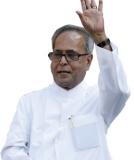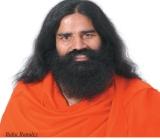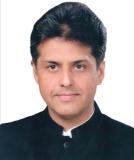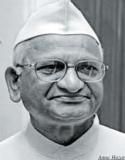Moving in Circles
Tussle over Lokpal Bill
The latest standoff over the shape of the Lokpal Bill seems to suggest that the government has taken the anti-corruption movement for a ride.
 Finance Minister Pranab Mukherjee’s charge that Anna Hazare and Ramdev dictate terms to the Centre is just a feeble attempt to divert the attention from the existing state of affairs. Finance Minister Pranab Mukherjee’s charge that Anna Hazare and Ramdev dictate terms to the Centre is just a feeble attempt to divert the attention from the existing state of affairs. |
With the Lokpal bill getting mired in fresh controversy, the representatives of the government and the civil society seem to be going round and round in circles with the two sides seemingly unable to reach a consensus. Big promises made by the Joint Drafting Committee on the Lokpal bill that the draft bill will meet the demands of the ‘civilsociety’ and get Parliament’s approval through consensus at the earliest have proved the other way round. Indeed the ongoing controversies between the government and civil society representatives confirm that there can be no meeting of minds. There are major differences over vital issues over the shape of the transparency bill. It is also clear that the panel made no mention of bringing the office of the Prime Minister under the ambit of the Lokpal, a major demand put forward by the activists. There was no agreement on the basic structure and Jurisdiction of the Lokpal. While the civil society representatives envisage Lokpal as an 11 member body similar to central information commission with a set number of lower and middle rung officers with powers to decide corruption cases, the government representatives have rejected it insisting on vesting all powers in an 11 member body. The ensuing war of words has put serious question marks on the future of the Jan Lokpal Bill. That Anna’s men have expressed suspicions about the government’s intentions was clear when his camp said that the government has already made up its mind and was trying to kill the institution of Lokpal before it was born. With Anna Hazare threatening to go onan indefinite fast by August 16 if the Lokpal Bill is not passed by then, there is a likelihood of fresh confrontation between the government and civil rights activists. It is unlikely they will agree on a draft even in the meetings scheduled later in the month. That the government is trying to implement its agenda by sidelining civil society is clear from its plan of putting two drafts on the transparency bill before the Cabinet by June 30th.
It is worth mentioning here that the UPA government was never serious about an effective Lokpal Law. The government, after initially going along with the demands of the Hazare led group to form the Lokpal Drafting Panel, was suddenly seen to be an obstructionist in setting up a mechanism that effectively reigns in the regime of corruption. Had it not been for the Assembly elections that were due when Anna Hazare undertook his fast, the UPA regime would not have acquiesced to his demand for setting a Joint Drafting Committee. There is no doubt that the Center agreed to Mr. Hazare’s terms only to persuade him to give up his fast. The present standoff is therefore on expected lines. The constitution of the drafting committee itself was a forced and a desperate effort to divert the aam admi’s attention from Anna Hazare and what he stands for. Now that the elections are over the party is showing its true colors.
|
|
There is a strong perception among the masses that the government of the day is utterly indifferent to widespread corruption that is putting a dampener on the nation’s growth and development. This explains why there have been spontaneous turnouts in support of the fasts and protests by those raising the issue. But more worrying is the fact that not only is the government not doing enough to check the growth of ubiquitous corruption but is also trying to silence those who are raising their voice against corruption. That the government needs a lot of time to act against corrupt politicians who siphon off public money like A. Raja and Suresh Kalmadi but barely 24 hours to swoop down and initiate brutal action against innocent protestors is really sad. Instead of showing its sincere commitment to check corruption, the ruling regime has chosen to denigrate the anti-corruption movement by cajoling Anna Hazare and Baba Ramdev to give up their campaigns and then defame them and their aids by leveling charges of malfeasance and malafide. In their endeavour to ensure that the Lokpal Bill does not see the light of day, the Congress leaders are trying to discredit civil society protesters by citing the RSS support to them. One can not help thinking that the government has taken the anti-corruption movement for a ride.
 Instead of showing its sincere commitment to check corruption, the ruling regime has chosen to denigrate the anti-corruption movement by cajoling Anna Hazare and Baba Ramdev to give up their campaigns and then defame them. Instead of showing its sincere commitment to check corruption, the ruling regime has chosen to denigrate the anti-corruption movement by cajoling Anna Hazare and Baba Ramdev to give up their campaigns and then defame them. |
That a consensus has evaded the joint committee is hardly surprising. The government which is in a spot after a series of ugly corruption scandals was only expected to resist public scrutiny. The way things are going, the RIL scam being the latest in the string of scams, it is unlikely that the UPA government will give in to the demands of civil society so easily. It would be naive to think that our politicians who have successfully thwarted the passage of the bill for so long will now allow it to be passed. It appears that the Centre wants to scuttle the Lokpal bill with the clear intention of shielding politicians and bureaucrats. The police action on Baba Ramdev’s protest confirms that the government has many skeletons in its closet. In fact the brutal crackdown only serves to cast aspersions on the intentions of the Congress led UPA to tackle corruption. It now looks like we are in for a watered down bill which will relegate the major issues to the background. As a result, even if the bill is enacted into law, it will not check real and rising concerns in society over scams.
Congress spokesperson Manish Tiwari’s statement that our democracy is threatened by unelected dictators highlights the very fact that the party is rattled by the growing enchantment among the people over its highhandedness in crushing anti-corruption protests. The truth is that it is because of the failure of the elected that credible members of civil society took up the issue of corruption. Our politicians who say that passing the laws is the sole prerogative of elected members should realize that the people elect them to work for the country and not for their selfish motives. Their performance index can be measured by the loot of public money over the years. Indeed, people are suffering from the tyranny of the elected politicians who use the CBI, the ED and the Income Tax Departments to suit their interests.
 Congress spokesperson Manish Tiwari’s statement that our democracy is threatened by unelected dictators highlights the very fact that party is rattled by the growing enchantment among the people over its highhanded Congress spokesperson Manish Tiwari’s statement that our democracy is threatened by unelected dictators highlights the very fact that party is rattled by the growing enchantment among the people over its highhanded |
Finance Minister Pranab Mukherjee’s charge that Anna Hazare and Ramdev dictate terms to the Centre is just a feeble attempt to divert the attention from the existing state of affairs. In effect, our parliamentary democracy is ‘weakening’ not because of social activists but due to the power hungry and corrupt politicians who are involved in the looting of public money. Therefore, instead of riding roughshod over the civil society representatives by accusing them of undermining democracy, our ‘elected’ representatives must do some introspection.
It is unfortunate that the government seems to be oblivious of the gravity of the situation. At a time when cynicism is ruling the people’s mind, the ruling elite needs to stop the blame game, skull drudgery and brazen efforts to communalise corruption. The sad irony is that the people are fighting against a corrupt government that is the sole authority to pass laws on corruption. Will the UPA ensure transparency and accountability? That is anybody’s guess.


 Had it not been for the Assembly elections that were due when Anna Hazare undertook his fast, the UPA regime would not have acquiesced to his demand for setting a Joint Drafting Committee.
Had it not been for the Assembly elections that were due when Anna Hazare undertook his fast, the UPA regime would not have acquiesced to his demand for setting a Joint Drafting Committee.
